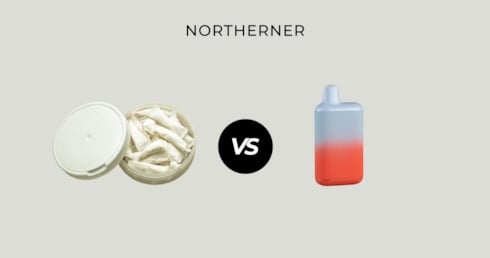Is Snus Better than Vaping?

Key Points
- Snus offers discreet use, no maintenance, and longer shelf life compared to vapes.
- Both snus and vape brands offer wide flavour options and are accessible online and in stores.
- The choice between snus and vaping often comes down to personal preferences and lifestyle.
When comparing snus to vaping, we're specifically discussing tobacco-free nicotine pouches, often referred to as "snus"*. Rather than focusing on health implications, we'll explore the practical differences between these two popular nicotine products in the UK.
*Tobacco-snus is banned in the UK and the European Union (except Sweden) under the Tobacco and Related Products Act 2016.
Snus vs. Vaping: A Brief Comparison
Here's a straightforward side-by-side comparison to help you quickly understand the differences:
|
Factor |
Snus (Nicotine Pouches) |
Vapes |
|
Nicotine Delivery |
Gradual release (20-60 mins) |
Instant nicotine |
|
Cost |
Varies across brands, no accessories |
Can be cheaper in the long run depending on usage patterns |
|
Flavour Options |
Wide range (mint, fruit, coffee, etc.) |
Vast range (menthol, fruits, etc) |
|
Discretion |
Highly discreet, no smoke or vapour |
Visible vapour |
|
Maintenance |
No maintenance, single-use |
Regular cleaning, charging, coil replacements (depending on the device) |
|
Shelf Life |
Long shelf life (months to years unopened) |
Shorter shelf life (e-liquid) |
|
Accessibility |
Widely available online and in shops retail |
Broadly available online and in shops |
Ease of Use
Nicotine pouches are straightforward to use; simply place a pouch under your lip, and you're set.
Vaping, meanwhile, requires some more attention. Depending on the vape, it can include device preparation, changing pods, charging, and routine maintenance.
Value for Money
Vaping may offer cost advantages over time, depending on usage habits and device type. Nicotine pouches, on the other hand, provide predictable pricing without the need for accessories or add-ons. Prices can vary based on purchasing habits and over time, for instance, buying snus in multipacks is typically more cost-effective than purchasing individual cans.
Use this cost calculator for a clear breakdown.
Flavour Variety
It’s fair to say that both products offer a wide flavour variety. Snus offers a large assortment of tobacco-free snus flavours, including mint, citrus, berry, and coffee. Vaping also provides vast flavour options, making both alternatives depending on personal taste preferences.
Where Can You Use Them?
Nicotine pouches can be discreetly used almost anywhere, even indoors where vaping may not be permitted. Vaping is often subject to restrictions, making pouches more versatile in public and social settings.
Shelf Life and Storage
Nicotine pouches have a significantly long shelf life, lasting around 1-2 years. They also require minimal storage conditions — just a cool, dry place.
Vaping products, especially liquids, can degrade and need more careful handling and regular use.

Is Snus Safer Than Vaping?
There’s no universal answer to this question. Both nicotine pouches and vapes are relatively new products, and research on their long-term effects is ongoing. However, according to the NHS, vaping exposes users to fewer harmful chemicals compared to smoking, as there’s no combustion involved. Similarly, nicotine pouches avoid inhalation of smoke and heated vapours, offering an alternative format that avoids vapour and combustion. Also, The European Code Against Cancer states that nicotine itself isn't a primary cause of cancer.
Many users opt for nicotine pouches and vapes as tobacco-free, smoke-free alternatives, which aligns with evidence from Smoke Free Sweden highlighting a growing preference for smoke-free nicotine options. Each product offers a different user experience without exposure to smoke.
Snus vs Vape – Which Is Better for You?
Ultimately, choosing between snus and vaping may well boil down to lifestyle and preferences:
- Discretion & Convenience: Snus is ideal for subtle, public use.
- Maintenance & Ease: Snus requires no maintenance; vaping involves upkeep.
- Portability: Snus is compact and easy to carry.
Users may consider what works with their daily routine. Whether snus or vaping aligns best with your lifestyle is ultimately a personal decision. Though it’s important to be aware that both products typically contain nicotine.
FAQs
Can you use snus indoors?
Yes, snus can be used anywhere since it produces no smoke or vapour.
How do nicotine pouches compare to vapes for convenience?
Nicotine pouches are a convenient option; unlike with vapes, no charging or maintenance is required.
How long does a nicotine pouch last?
Typically, a nicotine pouch lasts from 20 to 60 minutes, depending on personal preference.
Are nicotine pouches widely available?
Yes, you can browse all snus in the UK conveniently online and in select retail outlets.
Do nicotine pouches expire?
Yes, but they have a long shelf life, typically months to years if unopened.
Sources
- Vaping to quit smoking, NHS
- Does nicotine cause cancer?, European Code Against Cancer (IARC)
- Using e‑cigarettes to stop smoking, NHS
- Missing the target, SmokeFree Sweden 2024
